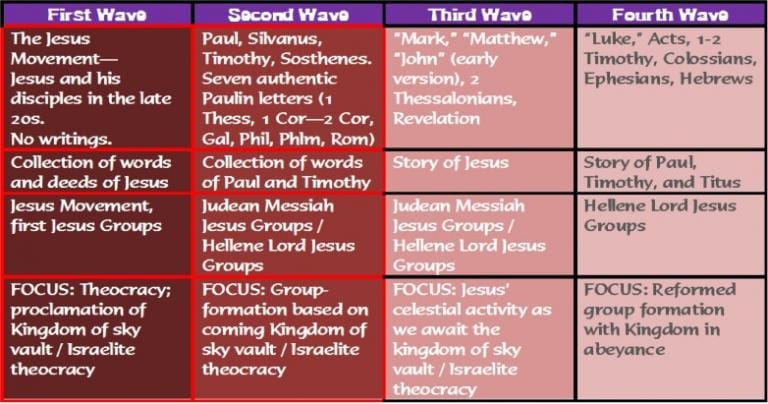
Apostolic succession is true, but maybe not in the way we often popularly imagine it in our spurious familiarity.
As we said before, apostolic succession concerns the fact that episkopoi (in the first century supervisors or managers), and later men called bishops, eventually took over the pastoral tasks of the apostles (God’s authorized change agents).
Contrary to popular understanding rampant among my fellow “C” Catholics, apostolic succession does not involve how the early episkopoi, and later bishops, were chosen or appointed. We know very precious little about that. We cannot be certain that a formal action designating them was in place in the first century Jesus groups.
Apostolic Language & Meaning
“But I see bishops in the New Testament!” Better check your lenses for anachronism. Even better, don’t trust your English Bible translations.
Language only means what it means where and when you use it. Move the language in time and place, and what happens? You just changed the meaning. Watch the videos below to see what I mean…
This happened again and again with language in the early Jesus groups. The meaning of words depends on where and when it gets used. Episkopos and “bishop” and “bishopric” are no different. So we have to be very careful with our translations and Bible quotes. We should never sling them about careless of context. It’s not loving. Take the time to give the context. A proof-text without context is a pretext.
Words Change in Meaning When You Move Them
Short and sweet, in the first century Jesus groups episkopos, presbyteros, and diakonos do not mean what later bishop, priest, and deacon mean. There is indeed a continuity between our Church and the Jesus Movement in the late 20s CE Galilee, yes. But that can only be a continuity-within-development. Nonscholarly fundamentalist apologists tend to see the Church as static. It’s not. It is a dynamic, evolving, living reality.
Case in point, there are good reasons to believe that the supervisors and elders and servants at Jesus group meals were shamanic figures keen on inducing altered states of consciousness experiences. And those who serve at meals, shamanic or otherwise, are quite different than those who preside at sacrificial offerings. In the first century context, the Lord’s Supper was part of a meal. Followers of Jesus, for a long time, primarily understood it as a meal. But as the centuries passed, the meal aspect vanished (completely until about the 1960s, and only then barely has been glimpsed since). Consequently, the sacrificial aspect of Eucharist blotted out the meal aspect, and so, those who ministered necessarily changed in role as well.
While it is Catholic doctrine to say that the bishops are the successors to the apostles, to go further and say bishops originate in Scripture is vague. If what you mean is that the roots of bishops are there, that’s fine. But there are no bishops as we know them today to be found in the New Testament.
Combing the Septuagint to see how episkopos is used in every instance (especially with your conclusion already set) will not yield light on how different Jesus groups used this term, or even if it was used in the first thirty years following the resurrection.
Getting Apostolic with “The Twelve”
Again we need to distinguish the role of “the Twelve” on the one hand and the role of “apostles” on the other. This must be done even if all of “the Twelve” were “apostles” also. Why? Raymond Brown explains it is because the doctrine of apostolic succession never suggests that the bishops are the successors of the Twelve, but rather the “apostles.”
In fact, to keep things clear, we should drop “the Twelve Apostles” when referring to “the Twelve” and just say “the Twelve” because “apostle” is hardly exclusive to just those twelve Israelite men. Actually, there were many more “apostles” beside “the Twelve”! But in contrast, as Brown says, there are no more than twelve thrones (in sky vault) used to judge Israel’s twelve tribes (like the twelve constellations in the ecliptic path of the Sun). Consequently, this special cosmic role (see Matthew 19:28 and Luke 22:29-30, taken from “Q”) only has room for twelve, no more, no less.
Cosmic Twelve
Therefore the case in the spin called “Acts” where Matthias replaces Judas simply doesn’t apply to apostolic succession as such. Despite erroneous English Bible translations that suggest Judas was a bishop in Acts 1:20, context is needed. As Brown explains, we find nothing in the earliest Jesus groups of needing to replace members of “the Twelve” when they die. Judas needed to be replaced because, abandoning his cosmic role among the Twelve, Israel could not begin to be renewed without twelve Israelite men to sit over the twelve tribes. This is not apostolic succession, folks.
“Acts” presents that process of Israel’s renewal beginning at Pentecost. The Twelve have a specific, non-transferable cosmic role in judging the Twelve Tribes in Israelite theocracy. If Peter or any of them had any successors (and I believe they do), it wasn’t as members of “the Twelve,” but rather as their other role, namely as “apostles” (i.e., change agents).
Apostolic Jesus Groups
Different from the cosmic role of “the Twelve,” Brown and other scholars explain that apostles went out to proclaim the gospel to Israelites and form Jesus groups. But when theocracy refused to manifest itself, and these change agents began dying, who would care for the Jesus groups left behind? Someone had to assume the pastoral responsibilities for the communities that had emerged from the apostolic mission. This was especially crucial, given the shocking reality that the Parousia and subsequent Israelite theocracy did not happen!
And by the time we reach the fourth wave Jesus groups in perhaps the last quarter of the first century, an office had been developed (and continued evolving) in many Jesus groups. This is where we first encounter the episkopos or supervisor, a manager of the Jesus groups. But by this time, we are still a far way out from a monarchical figure!—some Jesus groups had committees of supervising elders! But eventually, definitely by Irenaeus’ day (d. 180 CE), there was one episkopos in each Jesus group. And things kept developing, and eventually we see bishops in the true sense.
So did men called “bishops” take over the pastoral care of Jesus groups established by first century change agents (apostles) evangelizing? Yes. Eventually. And that is what apostolic succession means.
Getting Apostolic with James
Be careful with Eusebius, patron saint of fundamentalists, and other writers anachronistically projecting their post-Constantinian terms backwards onto people like James the Just and others. James should not be called a bishop or even an episkopos in the senses these terms were used later on. Also we don’t know how James, the brother of Jesus, actually managed things, or with whom he managed things. Be wary of saying things are clear, obvious, or apparent in Scripture.
Now, considering James’ central and authoritative position in Acts 15 please recall Peter’s earlier escape from prison in an altered state of consciousness experience in Acts 12:1-17. Notice the Lukan Peter orders that a report be given to James (Acts 12:17) the brother of Jesus (Galatians 1:19; Matthew 13:55). In the collectivistic Middle East, both in Luke’s day and present, family bonds are most important. Even if there be only one king, administration and rule is enjoyed by the entire family. Nepotism? You bet—and it is proper and right in the cultural world of the Scriptures. Sorry Americans!
Bellarmino Bagatti, a Franciscan archaeologist who extensively excavated Nazareth, indicates for three centuries the biological kin of Jesus ruled the Jesus group there. Think about it—as we said, Peter and “the Twelve” did not administrate the Jesus groups. That wasn’t their role. It makes perfect Middle Eastern sense that the blood relatives of Jesus should occupy authoritative roles in the continuation of the risen Jesus’ political religious movement. This early Galilean Messianism (what many scholars anachronistically call “Jewish Christianity”) was that part of the Jesus Movement retaining many barbarian Israelite practices but who recognized God doing something new in Jesus Messiah.
Apostolic Waves
Sometimes fundamentalist Catholics appeal to 2 Timothy 4:1-6 and claim that Paul apparently is giving his episcopal powers and office to Timothy. Paul died in the mid-60s CE, and was the most visible figure from the second wave Jesus groups. But the document called 2 Timothy was written decades after, in the fourth wave.

Since the 1750s, the New Testament documents called “Timothy” and “Titus” have been called “the Pastoral Epistles”—except by nonscholarly conservative Christians. When it comes to understanding the Church historically, there are scholarly and nonscholarly conservatives.
Currently, New Testament scholarship is almost unanimous in that Paul could not have written these documents. Analysis of style and lexical elements in comparison with the seven authentic Pauline letters demonstrates that these documents are forgeries. By the way, that doesn’t mean they aren’t inspired… watch the video below:
The Apostolic Pastor and His Inspired Forgeries
If not Paul, who then wrote the Pastorals? The real author was someone scholars refer to as “the Pastor.” When were they composed? Sometime after 80 CE, way after Paul’s death, and likely, after the deaths of the historical Timothy and Titus. Following Bruce Malina and John Pilch, “the Pastor” was an anonymous fourth wave Jesus group writer who honored the memory of Paul.
Therefore, via what both Plato and Cicero would call an acceptable rhetorical tool, “the Pastor” attempted to contemporize Paul’s teaching, re-contextualizing it for new circumstances. He basically makes up the recipients of his letters—“Timothy” and “Titus” in the Pastorals are literary fictions named after real historical associations Paul had. They help actualize Paul’s presence in his “noble lie” forgeries. God works in the mess, folks.
Again, fourth wave Jesus groups, specifically in Ephesus, gave origin to the Pastorals. Note well how they spin Paul, Timothy, and Titus, all second wave Jesus group figures. As the authentic corpus of Paul’s documents attest, the historical Paul was a change agent, and Timothy and Titus were his aides or change agent coworkers. But the fictional “Timothy” and “Titus” of the Pastorals are made to be ideal managers or supervisors, that is, episkopoi.
It is very likely that by the time the Pastorals were composed, the historical Timothy was dead. If he was still alive, he would be very old, full of years and experience. But the fictional Timothy of 1—2 Timothy is depicted as very young and inexperienced!
The Pastorals Demonstrate Apostolic Succession
These letters therefore do demonstrate the reality of apostolic succession—an itinerant change-agent or “apostle” (Paul) was succeeded by a local or sedentary Jesus group manager (episkopos). But these texts don’t support the idea that the historical Paul actually passed on an “office of bishopric” to Timothy or Titus, as if these younger men were his handpicked successors. Paul was not a bishop (nor supervisor) to the Jesus groups he founded. In fact, most of the time, traveling change agent Paul didn’t know what was going on in the Jesus groups he established!
Moreover, Paul intended to achieve a termination point within his lifetime in ongoing relations with the Jesus groups he founded. This is typical for change agents. As John Pilch explains, once his client groups adopted Paul’s innovation (“Gospel of God”) in a stable fashion, terminal relationship resulted. And this is what happened to first and second wave change agents and their Jesus groups. Local central persons, sometimes a board of elders (1 Timothy 4:14; Titus 1:7), sometimes a single central supervisor (1 Timothy 3:1; Titus 1:7) succeeded the change agents. That’s apostolic succession, folks.
Again, don’t trust your English translations. “Traduttore, traditore!”—every translator is a traitor. That’s also true with the NABRE, NRSV, and RSV every time you see “bishop.” It should be “supervisor.”
Believing in apostolic succession is great. But imagining that Peter, the Twelve, James, and Paul were all functioning bishops in the first century isn’t. Ultimately, it’s time we realize that Catholics need to learn and articulate the faith beyond Sunday School child catechesis.












